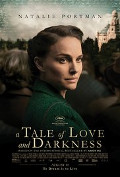
Directed by
Natalie Portman
98 minutes
Rated M
Reviewed by
Sharon Hurst

Tale Of Love and Darkness, A
Synopsis: Internationally-renowned Israeli writer Amos Oz (Amir Tessler) was a young boy in Palestine after the war. His memoirs of this time, upon which this film is based, recalls not only the turbulent days of 1948 when the state of Israel came into being, but also his parents, refugees from European persecution in the 1930s.
Amos Oz, who was born in Jerusalem in 1939, is now a professor of literature at Beersheba University in Central Israel. His love of words, and ultimately his drive to write was inspired by his mother who told the boy endless stories, many based upon Jewish folk-tales, throughout his early years. Oz's book came to the attention of director Natalie Portman about seven years ago. She was so impressed she wrote a screenplay, and has directed and stars in the film, as Fania, Amos’s mother. While we think of her as an American movie star, she was born in Jerusalem (her birth name was Natalie Hershlag) to a Jewish family and clearly Oz’s story resonated with her. In adapting it for the screen, like that rare breed of writer/director/actors before her, Portman has risen to the challenge in a stellar fashion.
In the opening scene a voice-over tells us that “my mother died at 38”. So we are to get no surprises as to the trajectory of this unhappy woman’s life. Oz tells us his mother dreamed of meeting a man who would be “pioneer, poet, worker, revolutionary – both emotional and intellectual”. This vision, which haunts her throughout her life, is a far cry from her loving but mundane husband, Arieh (Gilad Kahana). Despite this Arieh also has a deep love of words and spends much time explaining Hebrew etymology to the young Amos, thus exemplifying a theme which reverberates through the story.
While the story is about a disintegrating marriage, the adoration of a son for his mother, the genesis of a writer’s creativity, a woman’s all-consuming depression, it is also about the history of a new nation, and some of the scenes foreshadow, ominously so, the terrible conflicts that still haunt that part of the world. Portman uses the voice-over, no doubt taken from Oz’s text, to sum up eloquently the ongoing issues resulting from the post-war establishment of a Jewish homeland in Arab territory.
Young Tessler is deeply affecting as Amos, and the child’s sensitivity and acuity with words is completely convincing. Portman exudes a sad, quiet radiance as Fania, the beautiful woman who came from a privileged family in Poland, and had idealised expectations of life in the Promised Land, only to have them “dashed against the harsh Jerusalem stone”.
Visually the film works a treat, the old Jerusalem neighbourhoods in which the story takes place look like they would have centuries ago. The use of light and shade and specific colour tones creates a palpable atmosphere while the often simple mise-en-scène realizes scenes of dramatic conflict powerfully.
Want something different?





